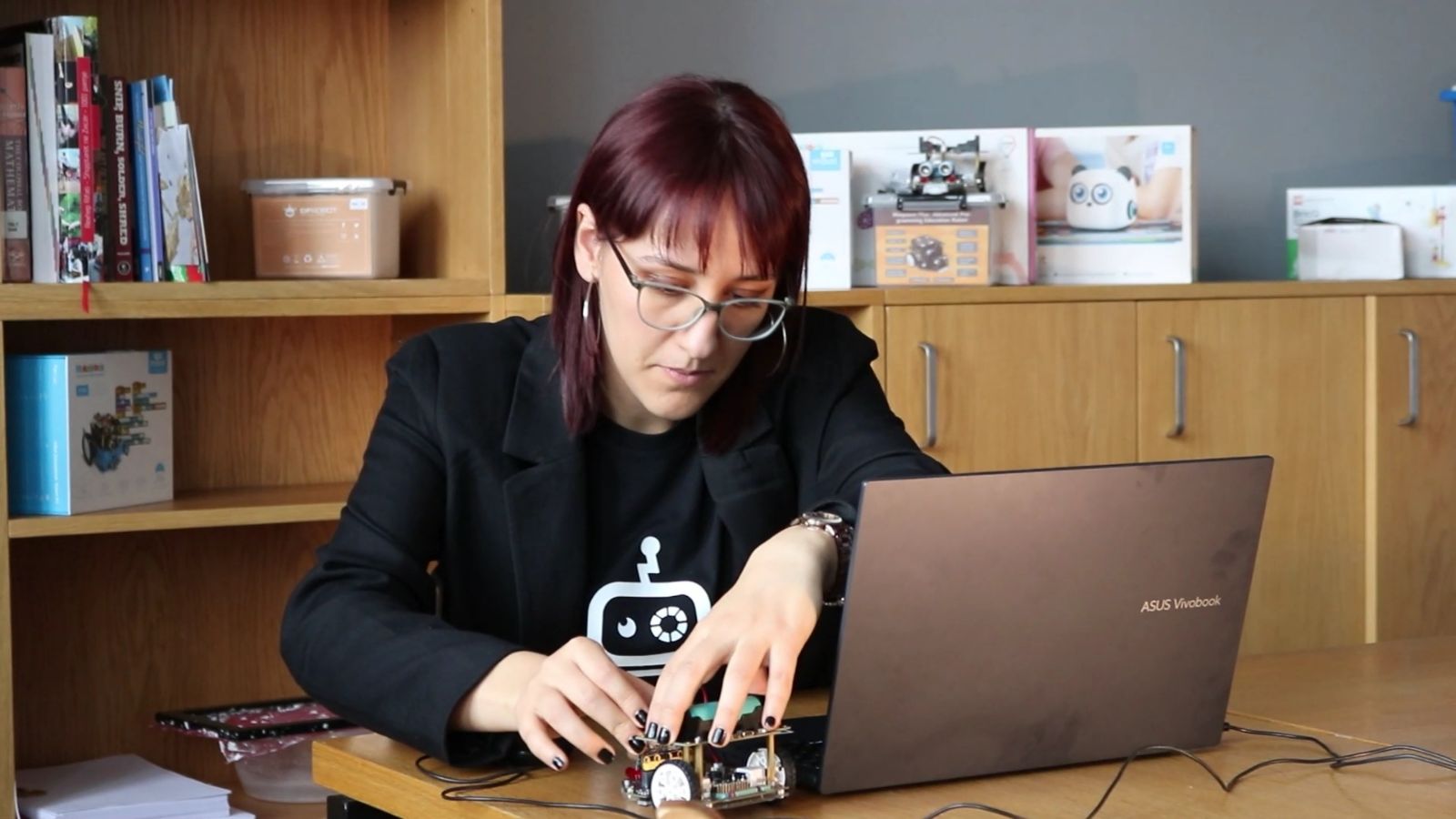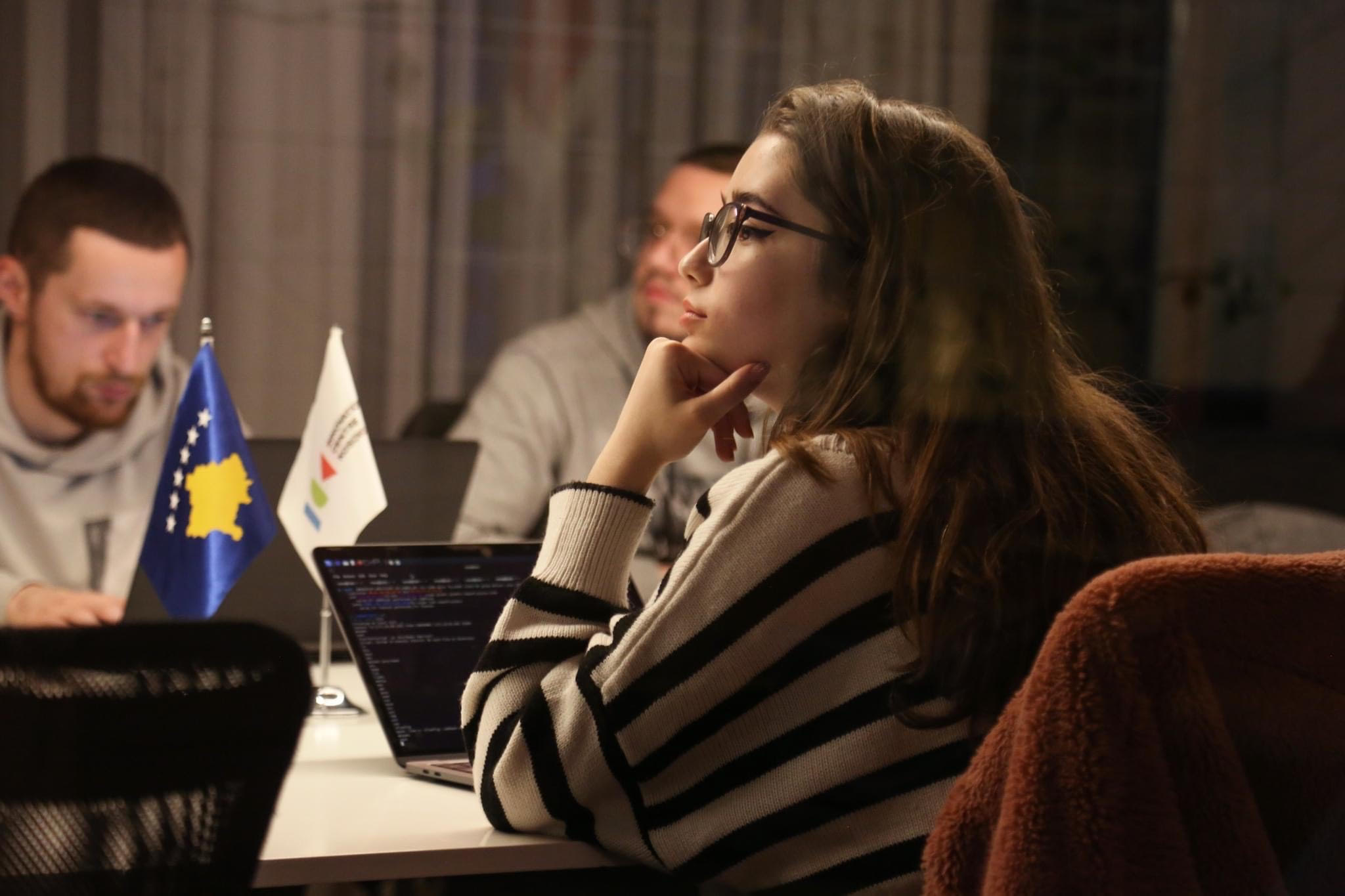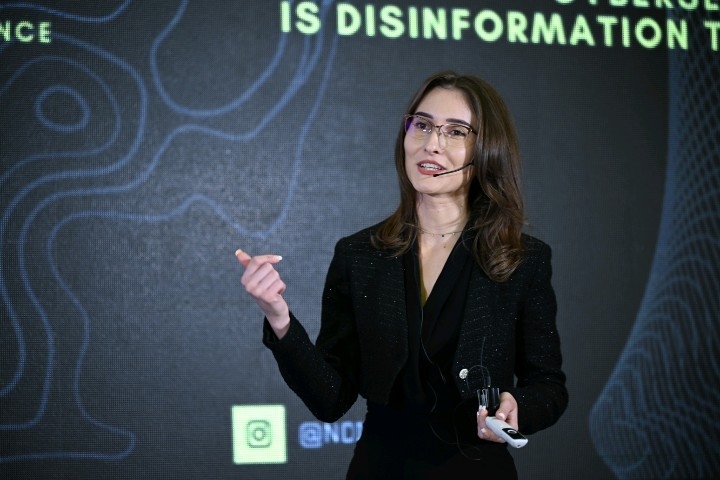The number of women studying information and communication technology has increased quickly in Kosovo, more than in many other European countries. Prishtina Insight looks closer at the phenomenon and the actors behind it.
For Rona Latifaj, a 19-year-old student in her second year of a computer science Bachelor’s program at the University of Prishtina, gender balance within her faculty is not much of a concern. “The number of girls and boys in my department is pretty even,” she observes, providing some basic statistics: 27 women students to 29 men students in the Bachelor’s program, and 9 women to 6 men in the Master’s program.
However, most of her professors at the university are men.
“In previous years, when you see how many of them have graduated, a third were women,” Rona continues. “And in the 1980s, when my parents graduated in engineering, only a tenth of the students were women.”
Although these proportions vary across faculties, the increase of girls in STEM [Science, Technology, Engineering, and Mathematics] field studies, that were traditionally men-dominated, in Kosovo is evident. Their participation has even surpassed 50 per cent this year, according to Valdrin Dervishaj, advisor to the Minister of Education.
“This is twice as many as in other countries in the EU. It is an example of fair and accurate investment of public funds,” he wrote in Facebook.
Here are some explanations to this positive trend. In the past two years, the Ministry of Education, Science and Technology in Kosovo has awarded 1,000 euros scholarships to a thousand women who decided to study in STEM fields, which has encouraged more women to apply.
“I know some of my friends who have applied to certain programs because of it,” mentions Rona.
A future of AI that does not discriminate women
Many students in the STEM field end up working in the men-dominated digital technology industry, often labeled as Information and Communication Technologies, ICT. However, there is a growing demand for change in this regard.
“We don’t want to have a future AI that is also gender-discriminating,” explains Donjeta Sahatçiu, deputy mayor of Prishtina.
“The more girls are involved in developing new tools, providing new content online, and contributing with big data, the less discrimination and stereotypes women will face in the future.”
When Sahatçiu joined the Municipality, a year and a half ago, she initiated the event “Girls in ICT” to encourage more girls to pursue science and technology. The second edition, held last month, attracted 5,000 participants and spread to other municipalities in Kosovo.
This initiative is complemented by other efforts taken by the Municipality to promote science and technology, such as coding clubs for girls, in some public schools.
Additionally, the plan for the future includes launching an open call for more than two types of opportunities for women in tech, including scholarships for students and grants for those proposing digital solutions to solve certain problems in the municipality.
Associations working to improve digital skills among young generations, and especially young girls have also played an important role in increasing the number of girls studying IT. “NGOs are now full of girls. Sometimes you just need to be natural in creating solutions. It is not enough to tell girls how things should be, they also need to see things in practice,” reflects Flatra Thaqi, managing director at Kosova Makers League platform. Her organization, which aims to familiarize children with technology, has noticed a significant increase in girls’ participation in the activities it organizes in schools, such as robotic competitions.

Flatra Thaqi is the managing director at Kosova Makers League. Photo courtesy of Thaqi.
Another significant player in the field is the Innovation Center of Kosovo, ICK. Over the years, it has emerged as a crucial contributor to building the ICT community in the country, providing support to hundreds of start-ups and training thousands of people during its 11 years of existence. In this regard, the impact of ICK’s pro-women policies may have been even more significant.
Functioning as both an incubator and a training center, the innovation center has implemented various incentives for women. For instance, 90 per cent of its scholarships were offered to women, and it organized campaigns, dedicated events, and more, all aimed at dismantling stereotypes. These efforts have yielded positive results, with an increase in women’s participation. Shpend Lila, the Innovation Center’s Public Relations Manager, notes, “The last 5 years were decisive in terms of getting more women in our programs.”
However, the endeavor to encourage women to pursue ICT studies sometimes sparks controversy. The Innovation Center often receives emails and complaints from young boys who feel there is a lack of scholarships for them.
Rona Latifaj, a student herself, acknowledges this issue, saying, “It was a hot topic among me and my friends because women have been given more opportunities than men currently.” Nevertheless, according to her, men of her generation generally don’t view this as a negative thing, “they support women because they are more oppressed by traditional ways of thinking.”
Cybersecurity Still Struggles to Attract Women
While stereotypes have not entirely vanished, they have lost their power to dictate women’s career paths. Young women working or studying in the field, that were interviewed by Prishtina Insight, express satisfaction with the support and opportunities available to them. However, prejudices occasionally resurface, such as remarks questioning the compatibility of such jobs with family life or the surprise of witnessing women working or even leading tech companies.
Despite demonstrating equal qualifications to men for ICT positions, women’s fear of failure is often amplified by gender stereotypes. Dorina Grezda, an incubator and project manager at ICK, explains, “Sometimes, it is necessary to boost their self-confidence and encourage them to participate in training programs to become more familiar with the subject.”
While many women now join programs in digital marketing, software engineering, and graphic and motion design, they still exhibit reluctance in joining other ICT fields, such as cybersecurity.
Shpend Lila attributes this partly to representation. “When you think about a hacker, you usually imagine a man. Anonymous’s mask, for example, portrays a man. Starting from their logo, assumptions are made, perpetuating the stereotype,” he says.
In addition to her faculty courses, Rona Latifaj is attending a cybersecurity training program at the Innovation Center, where she found herself to be the only woman among a group of 14 people. Initially, she confesses feeling intimidated, questioning whether she would find friends and project partners.
However, she eventually felt comfortable and discovered her coursemates to be “especially respectful and kind.” Rona believes that crushing stereotypes is not as challenging as it may seem, it simply requires courage and determination.

Rona Latifaj is a second year computer science student who is also taking a cybersecurity class at the Innovation Center. Photo / ICK
Setting Examples
Rina Basholli serves as a living example of breaking stereotypes. At just 26 years old, she works as an information security engineer and lead at KODE Labs, an American company specializing in smart buildings, with an office in Kosovo as well. When she completed her Master’s degree in Cybersecurity at the University of Sheffield, she was the only woman in her cohort.
“There is something about paving a path for other [women], which requires doing double the work,” she reflects. However, she did not personally encounter significant gender stereotypes in her field. “I consider myself fortunate because I was part of the

Rina Basholli stands as one of the very few women working in the field of cybersecurity in Kosovo.Photo credits: courtesy of Basholli
feminist movement that supported women, and my family was behind me,” she says.
She strongly believes in the importance of setting examples. Her inspirational female role models include Hedy Lamarr [1914-2000], the pioneer of Wi-Fi, and Ada Lovelace [1815-1852], the creator of the first written code.
Today, young women have access to more contemporary sources of inspiration, including Albanian figures like Mira Murati, one of the inventors and the Operations Director of ChatGPT.
As a pioneer for women in cybersecurity, Rina Basholli believes she has a responsibility to uphold. She currently serves as a board executive for an international organization called WiCys, which aims to raise awareness about women in cybersecurity. “I am trying to bring [this NGO] to the Balkans. We need to educate women to be confident and take risks, not necessarily to be perfect,” she concludes.
Eddie RABEYRIN is an intern at Prishtina Insight. After working for several years in the French local press, he resumed studies to do a Master’s degree in international relations at the University of Strasbourg, France.





